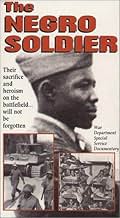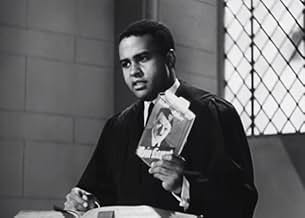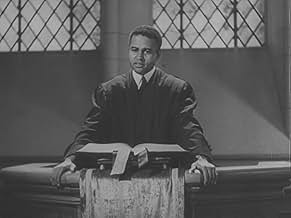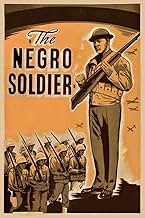Ajouter une intrigue dans votre langueDocumentary focusing on the contributions to the American war effort of African-American soldiers.Documentary focusing on the contributions to the American war effort of African-American soldiers.Documentary focusing on the contributions to the American war effort of African-American soldiers.
- Récompenses
- 2 victoires au total
Clyde Turner
- Soloist in Church
- (as Sgt. Clyde Turner)
Bertha Woolford
- Mrs. Bronson
- (as Bertha Wolford)
Norman Ford
- Lt. Robert E. Bronson
- (as Lt. Norman Ford)
Gertrude Elise Ayer
- Self - Principal
- (images d'archives)
Richmond Barthé
- Self - Sculptor
- (images d'archives)
- (as Richard Barthe)
Erich Borchmeyer
- Self
- (images d'archives)
Dean Dixon
- Self - Conductor
- (images d'archives)
W.C. Handy
- Self
- (images d'archives)
Matthew Henson
- Self - Polar Explorer
- (images d'archives)
Adolf Hitler
- Self
- (images d'archives)
Cornelius Johnson
- Self
- (images d'archives)
Henry Johnson
- Self - WW1 Soldier
- (images d'archives)
Ralph Metcalfe
- Self
- (images d'archives)
Lawrence Reddick
- Self - Museum Curator
- (images d'archives)
Commentaire à la une
A US World War 2 propaganda film, showing how African-American soldiers are helping the Allied cause.
A well-made propaganda film. Quite stirring in showing the contribution African-Americans had made to previous wars and were making to the current war, World War 2. Made to convince African-Americans to join up and help win the war it does well to paper over the race-based social divide that existed in the US at the time.
Quite sad in the respect in that, while it was okay for African-Americans to fight and die for their country, they were treated as second class citizens at home, with less rights than whites. Just the fact that the film had to be made is a sad reflection of the times.
This said, it is very effective in its purpose and is even quite emotional at times. Some good military footage too.
A well-made propaganda film. Quite stirring in showing the contribution African-Americans had made to previous wars and were making to the current war, World War 2. Made to convince African-Americans to join up and help win the war it does well to paper over the race-based social divide that existed in the US at the time.
Quite sad in the respect in that, while it was okay for African-Americans to fight and die for their country, they were treated as second class citizens at home, with less rights than whites. Just the fact that the film had to be made is a sad reflection of the times.
This said, it is very effective in its purpose and is even quite emotional at times. Some good military footage too.
Histoire
Le saviez-vous
- AnecdotesIn 2011, the film was selected for preservation in the National Film Registry by the Library of Congress with the following statement: "'The Negro Soldier' showcased the contributions of blacks to American society and their heroism in the nation's wars, portraying them in a dignified, realistic, and far less stereotypical manner than they had been depicted in previous Hollywood films."
- Versions alternativesAccording to government documents, a two-reel shortened version of the film was released in July 1944.
- ConnexionsEdited from Pour l'indépendance (1924)
Meilleurs choix
Connectez-vous pour évaluer et suivre la liste de favoris afin de recevoir des recommandations personnalisées
Détails
Box-office
- Budget
- 78 254 $US (estimé)
- Durée43 minutes
- Couleur
- Mixage
- Rapport de forme
- 1.37 : 1
Contribuer à cette page
Suggérer une modification ou ajouter du contenu manquant

Lacune principale
By what name was The Negro Soldier (1944) officially released in Canada in English?
Répondre
























